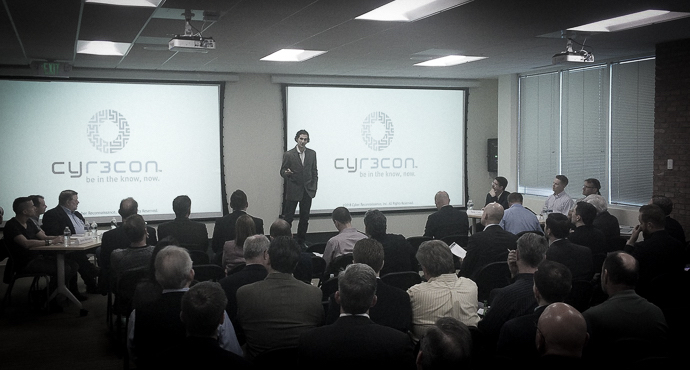
DataTribe Challenge showcases three innovative startups.
DataTribe's inaugural Challenge held its finals today. Three innovative startups were selected from a field of about a hundred applicants to compete for a share of a $20,000 purse, and, more importantly, for an opportunity to receive a DataTribe-financed seed funding round of up to $2,000,000. The finalists were Prevailion, CYR3CON, and Inertial Sense.
Prevailion: precongitive compromise intelligence.
Prevailion presented to the judges first. Their platform promises to bring precognitive compromise intelligence that enables enterprises to preempt and attribute attacks. They focus on "the already highly compromised supply chain, vendor and contractor ecosystem." Karim Hijazi, the company's CEO and co-founder, began his presentation by alluding to his experience at RSA 2018 last week, where he found it scary to see the ways in which all sorts of the security that companies are buying seems to be failing. Prevailion's platform, which he characterized as a "business compromise intelligence platform," clearly demonstrates that this is the case. They start with telemetry sensors in a "no-touch" service that lives on the Internet, not in the customer's systems, and they're able to determine bad actors' names, locations, IP addresses, and so on. He presented three sample use cases: supply chain security, M&A analysis, and cyber insurance underwriting. He stressed that their platform is not a noisy sinkhole. Rather, the sensors are deployed in an agile and obscured fashion that makes them difficult for bad actors to detect and evade.
CYR3CON: machine learning for proactive prediction.
CYR3CON (pronounced "cy-recon") combines machine learning with the ability to comb some of the most restricted parts of the Internet to deliver timely and active predictions that help its customers become proactive about security. CEO and co-founder Paulo Shakarian presented the company as one that was able to take the insights of computational social science and apply them to security. Their approach, he said, is the least expensive option for effective defense. Noting that attackers' use of zero-days has fallen over the past three years, he suggested that the real risk lies in the known but unpatched vulnerabilities. Many of those vulnerabilities cannot be patched quickly, easily, or affordably. But hackers use less than 3% of known vulnerabilities, and hacker chatter provides clear clues as to which ones are likeliest to be exploited. Manual analysis of that chatter doesn't scale, but CYR3CON's machine-learning technology does. They've been able to identify, accurately, the most serious incidents with high confidence, providing actionable warnings for such major exploits as NotPetya and the Apache STRUTS exploit that hit Equifax about two months in advance of the attacks.
Inertial Sense: small, affordable navigation for the Internet-of-Movable-Things.
Inertial Sense offers miniaturized high-performance GPS and inertial navigation systems, fusing attitude heading reference and inertial measurement sensor systems for the smallest, most accurate and cheapest sensor platforms available in the world today. While not a cybersecurity company (except perhaps at one or two removes) they are a big data analytics shop, which explains why they were in the final round. GPS is already beginning to show its age as a technology. It lacks the requisite precision for many applications people want (consider not only self-driving cars, but drone delivery, precision agricultural operations, and the like). They have a sensor package slightly smaller than a US dime and costing well under a hundred dollars that provides location accuracy of four-centimeters. Their COO and co-founder, Brian Cahoon, described the company as revolutionizing the robotics, autonomous vehicle, drone, and automated manufacturing industries.
The judges' decision.
At the end of the event the judges chose not one, but two winners, who now enter due diligence for seed funding. The winners were Inertial Sense and Prevailion, but all three companies will clearly be worth watching.
The panel of judges included Bob Ackerman (founder and managing director of Silicon Valley cybersecurity venture firm AllegisCyber), Mike Janke (co-founder of DataTribe), Steven Witt (co-founder of DataTribe), Mike Aiello (Product Manager at Google), Tony Cole (Chief Technology Officer, Attivo Networks), John Stewart (Chief Security and Trust Officer, Cisco), and Daniel Weinand (co-founder of Shopify).
DataTribe is neither traditional incubator nor venture capital firm, although it shares certain features of both. It describes itself as a "startup studio co-building the next generation of commercial cybersecurity, analytics, and big data products with breakthrough technology and teams from the US Intelligence Community and research labs." It sees the area between Baltimore and Washington as a center of talent with considerable unrealized potential. As AllegisCyber's Bob Ackerman said when he spoke at the event, the region enjoys the largest concentration of world-class, cyber-relevant engineering talent one could hope to find anywhere. DataTribe's goal is to help that talent realize its commercial potential.
Some of the companies it's nurtured will be familiar. Dragos, the industrial control system security shop, has become well-known in the sector. Last year's runner-up in the RSA Innovation Sandbox, EnVeil, which has a solution that encrypts data-in-use, is another one of DataTribe's alumni. And this year DataTribe had another Innovation Sandbox finalist: ReFirm Labs, specialists in firmware security with a promising approach to securing the supply chain.
Disclosure: The CyberWire's offices are located in space at DataTribe's facility in Fulton, Maryland.